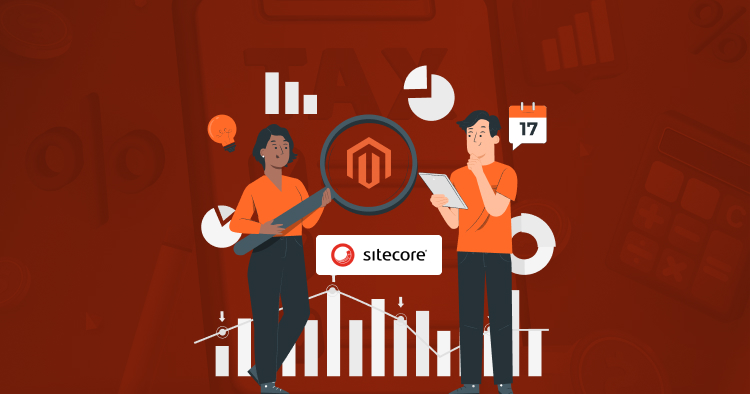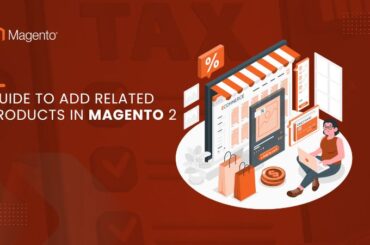Magento vs Sitecore – A Detailed Comparison
Last Updated | September 12, 2023
Table of Contents
Do you want to develop an E-commerce website but you don’t know which platform is best among Magento and Sitecore?
If yes, you are at the right place because this guide will give you a detailed comparison of Magento vs Sitecore.
The global pandemic served as a catalyst to digitalize the shopping experience. As a result, different businesses require an online store allowing the consumers to buy products online.
Due to the offered customization and suitability, Magento and Sitecore are two popular online platforms to support E-commerce websites.
Magento vs Sitecore: An Overview
Read along to learn the in-depth comparison of Magento vs Sitecore along with their applications and uses.
Magento
Released in 2008 by Varien and developed on Zend Framework, Magento is an E-commerce platform with built-in PHP. Different Magento Web development companies use PHP frameworks such as Symfony and Laminas to assist thousands of businesses globally to create online stores, such as Samsung, Nike, etc.
Later in 2018, Adobe acquired Magento for $1.68 billion to extend the commerce loop. Magento offers different features and functionalities to build, customize, run, and scale an online store.
The good news is that businesses can either opt for a free or paid cloud-hosted version, depending upon the website’s requirements. The basic features of Magento include product management, client accounts, reporting, search technology, and Magento support and maintenance.
Sitecore
Sitecore combines content management systems with automation omnichannel technologies to ensure customer experience management.
Founded in 2001 in Denmark, Sitecore is a content management system CMS based on ASP.NET. Hence Sitecore Commerce allows small and medium-sized businesses, SMEs, and other global organizations to develop, edit, and control E-Commerce websites.
Some of the notable features of Sitecore include automated marketing, built-in analytics user data, scalability, security, and mobile-ready websites.
Read More: Shopify Vs LightSpeed Ecommerce
Magento vs Sitecore: Features
Apparently, the users may not find any difference between Magento and Sitecore; However, both these online platforms offer different business purposes based on their features.
For instance, Sitecore offers advanced Automated Marketing features to integrate different marketing platforms into the CMS. This way, businesses can elevate the user experience by customizing the web content according to the customers’ liking.
Similarly, the built-in analytics usage data allows the companies to monitor and analyze the consumers’ and buyers’ behavior. Hence, companies can tailor the web content to improve customer retention and loyalty.
Alternatively, Magento offers advanced Payment and Delivery features allowing the companies to collaborate with different payment systems to offer diverse modes of payments.
Furthermore, the Magento B2B pricing ensures productivity in the B2B commerce store with its features, such as Quick Order and Company Credit, facilitating payment. In addition, the Shared Catalog facilitates the sellers to create customized sales and deals pages for different consumer segments.
This table provides a structured way to compare Magento and AEM based on various aspects. You can add or modify rows and columns to match your specific evaluation criteria. Each aspect can be given a rating or a brief description to provide further details.
| Aspect | Magento | AEM (Adobe Experience Manager) |
|---|---|---|
| Ecommerce Features | Robust catalog management, extensive plugin ecosystem | Strong content management, limited ecommerce features |
| Performance | Fast page load times, handles high traffic well | Depends on server setup and content complexity |
| User-Friendliness | Steeper learning curve, geared towards developers | User-friendly interface, suitable for marketers |
| Customization | Highly customizable, ideal for unique designs | Customization may require development expertise |
| Integration | Extensive third-party integrations available | Strong integration with Adobe Marketing Cloud |
| SEO and Marketing | Good SEO tools, extensive marketing extensions | Strong marketing capabilities with Adobe Marketing Cloud |
| Community and Support | Large community, extensive documentation | Strong support and resources, but smaller community |
| Cost | Open-source (Community Edition) and paid versions | Higher licensing and implementation costs |
| Security | Regular security updates, active community | Strong security features, actively maintained |
| Scalability and Growth | Scales well for small to large businesses | Scalable but may be cost-prohibitive for small businesses |
| Real-World Use Cases | Popular among ecommerce stores of all sizes | Preferred for enterprise-level content-driven websites |
| Overall Verdict | Ideal for ecommerce-focused businesses | Suited for content-heavy sites with integrated marketing |
Magento vs Sitecore: Personalization and Customization
Both Magento and Sitecore offer unmatched customization to enhance user experience. On one side, the Sitecore ecosystem ensures personalization optimization while Magento offers different plugins to connect different external systems and application partners. On the other hand, it means Magento’s customization features offer a diverse range of applications not limited to the platform itself.
The Automated Marketing tool by Sitecore facilitates the marketers to analyze consumer behavior to elevate user experience and offer a customized shopping experience.
Alternatively, Magento simplifies payment and ordering with its advanced purchasing features to offer a hassle-free shopping experience.
Magento vs Sitecore: Scalability
Sitecore offers Platform-as-a-Service (PaaS) as well as cloud functionality to minimize the cost based on the server usage at peak and non-peak times. Not only that, but the companies can use Sitecore’s built-in utilities to scale the company instead of using external features.
From determining the website’s scale to creating advertisement portals, Magento offers unparalleled scalability to businesses. Not only that but Magento 2 offers software to help businesses collect the data effectively to forecast future trends.
Courtesy of the collaboration with different companies such as DataDog, Google Analytics, Splunk, New Relic, and MixPanel, Magento helps businesses analyze critical data for future scalability requirements.
Magento vs Sitecore: Content Management
Sitecore is companies’ number one choice when it comes to implementing a content management system. It’s because of the three features of Sitecore, such as SitecorexConnect API, personalized customers data, and A/B and multivariate testing.
Hence the companies can collect and synchronize the data between Sitecore and other marketing and sales systems. Moreover, Sitecore can analyze customer behavior and automatically filter the content that matches the search requirements. Lastly, the review and monitoring tools evaluate the performance of the content and traffic channels, allowing the businesses to change their strategies accordingly.
Alternatively, Magento offers a product-based Ecommerce solution and collaborates with Adwords and Google Ads to analyze the customer’s demands.
Magento vs Sitecore: Pricing
Magento 2 cost varies based on the three pricing options. For instance, the Magento Open Source is free to download and install, while the company needs to pay for the domain, hosting, and other security services.
Alternatively, the Magento Commerce and Magento Commerce Cloud price depend on the company’s gross sales revenue per year. For instance, if the gross sales revenue per year is less than $1,000,000, the company needs to pay $22,00 for Magento Commerce and $40,000 for Magento Commerce Cloud.
On the other hand, Sitecore has a straightforward license fee of $40,000 for the first year and $8,000 for additional years to come. However, the annual support and licensing fee are around $10,000, while the implementation cost starts from $65,000.
Magento vs Sitecore: Ease of Use
In terms of user-friendliness, Sitecore is a better option than Magento. A user-friendly architecture coupled with a simple platform allows the no-technical users to develop functional websites.
However, Magento is for advanced web developers who understand programming.
Magento vs. Sitecore: Support
The good news is that Open Source Magento (free version) features different support groups, including Magento and DevDocs Forum. Similarly, Magento Commerce (Enterprise) offers efficient customer 24/7 support by phone, email, and live chat.
On the other hand, Sitecore offers two types of support options, including Standard and Premium Support. For instance, the Stand support offers a Sitecore Support Portal with a response time of one to three business days. Alternatively, Premium Support offers 24×7 support for critical issues.
Final Words
It’s needless to say both Magento and Sitecore are the top platforms for developing and customizing eCommerce sites. However, these platforms have advantages based on scalability, content management, customer data analysis, and other payment features.
The key takeaway of the above guide is to facilitate the companies to evaluate their business requirements and select a platform accordingly to create an E-commerce website.
FAQs:
1. Is Sitecore an eCommerce platform?
Sitecore is essentially an experience commerce platform that helps businesses customize the storefront experience according to the buyer’s demands and preferences.
2. Is Magento better than Sitecore?
If you want to develop a B2B or B2C E-Commerce website, Magento is better than Sitecore. It’s because Magento offers a lot of flexibility by incorporating different payment methods to facilitate the buyers.
On the other hand, Sitecore is better than Magento in terms of user-friendliness since the platform is easy to use even by non-technical people.
3. How is Magento a better choice than Sitecore for eCommerce?
In terms of feature updates and roadmaps, Magento Commerce is better than Sitecore. It’s because Magento fulfills different business requirements by offering customization to the E-Commerce store. Magento dropshipping and payment methods enable businesses to collaborate with different suppliers and incorporate payment modes to facilitate the buyers.
4. Reasons to Hire Someone for Magento Maintenance Services?
As discussed, Magento is an advanced platform that requires programmers to install and optimize websites, update security patches, and update the E-Commerce platform.
A business needs to hire Magento support and maintenance services to address issues such as website failure and minimize downtime.
5. What is the maintenance mode in Magento 2?
If Magento 2 is in maintenance mode, the buyers usually see a message saying “Service Temporarily Unavailable” on the web browser. This way, the programmers and developers can test the website before making it live and accessible to the customers.












